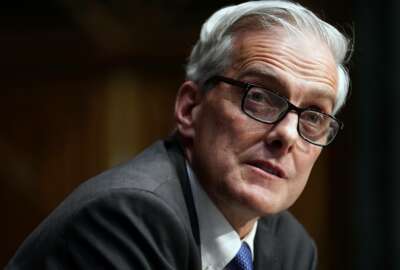VA launches historic health care expansion under accelerated PACT Act eligibility timeline
On March 5, all veterans exposed to toxic substances and other hazards during military service at home or abroad will be eligible to enroll directly in VA health...
The Department of Veterans Affairs is launching one of the biggest expansions of health care in its history, by accelerating the eligibility timeline under the PACT Act.
On March 5, all veterans exposed to toxic substances and other hazards during military service — at home or abroad — will be eligible to enroll directly in VA health care without first applying for VA benefits.
That includes all veterans who served in the Vietnam War, the Gulf War, Iraq, Afghanistan, the global war on terror, or any other combat zone after 9/11.
Veterans who never deployed but were exposed to toxins or hazards while training or on active duty in the United States will also be eligible to enroll.
President Joe Biden announced this accelerated PACT ACT eligibility timeline last November, on Veterans Day.
The accelerated PACT Act deadline means millions of veterans are becoming eligible for VA health care up to eight years earlier than what was written into the law.
VA Secretary Denis McDonough said in a statement Monday that “VA is proven to be the best, most affordable health care in America for Veterans – and once you’re in, you have access for life.”
“If you’re a veteran who may have been exposed to toxins or hazards while serving our country, at home or abroad, we want you to come to us for the health care you deserve,” McDonough said.
VA Under Secretary for Health Shereef Elnahal said in a statement that, veterans who never deployed but were exposed to toxins or hazards — including chemicals, pesticides, lead, asbestos, certain paints, nuclear weapons, and x-rays —while training or on active duty in the U.S. are among those eligible to enroll in VA health care under the PACT Act.
“We want to bring all of these veterans to VA for the care they’ve earned and deserve,” Elnahal said.
VA says veterans enrolled in VA health care have better health outcomes than non-enrolled veterans, and VA hospitals outperform non-VA hospitals in overall quality ratings and patient satisfaction ratings. The department also says VA health care is often more affordable than non-VA health care for veterans.
Elnahal told reporters last month that, under an accelerated eligibility timeline, VHA expects that nearly 21,000 additional veterans will enroll in VA health care under the PACT Act in fiscal 2024.
“We’re not talking about huge increases in veteran enrollment, because there are already so many doors that veterans can already enter. But that’s part of the reason why we decided to accelerate that eligibility because we think we can handle that capacity,” Elnahal said.
Over the next five years, VHA expects nearly 55,000 new veterans will enroll in VA medical care under the PACT Act. Over the next 10 years, it expects more than 84,500 veterans will enroll in VA health care under the PACT Act.
“The enrollment numbers go up, because we know that veterans who were engaged in these theatres of deployment, these theatres of war, will likely have an escalating need for health care as they age,” Elnahal said.
The VA is seeing higher-than-expected enrollments in health care under the PACT Act.
Under the PACT Act, more than 100,000 new veterans have enrolled in VA health care since the legislation was signed in August 2022. That’s out of the more than 500,000 total health care enrollments during that same period.
“In general, being present in the community and letting veterans know across the country that VA is an option for them, I think, has led to an overall increase in enrollments over and above what we would have expected,” Elnahal said.
Meanwhile, Elnahal said VHA is seeing “asymmetric growth” in the places where veterans are enrolling in VA health care across the country.
VHA is seeing record numbers of new enrollees in the Southeastern U.S. — including in parts of North Carolina, South Carolina, Georgia and most of Florida.
The agency is also seeing significant enrollment in Chicago, Texas, New Mexico, Arizona, San Diego and Southern California more broadly.
Elnahal said VHA is trying to increase capacity by setting up new VA clinics and hiring more staff.
“These are the areas where we are seeing the most veteran growth and as a result, it’s where we’ve concentrated our hiring efforts and determined where we’ve needed more [full-time equivalents],” Elnahal said.
To keep up with “unprecedented growth” in demand for VA health care under the PACT Act, VHA is running “access sprints” to increase appointment availability across three areas of care — cardiology, mental health and gastroenterology.
Elnahal said VHA is expanding access to appointments in these areas by offering night and weekend clinics, and by increasing the number of veterans that each VA provider sees for appointments.
“Across the board, we’ve seen increases in the number of appointments delivered,” Elnahal said.
Elnahal said VHA saw “pretty consistent increases week-to-week” for mental health care appointments in December 2023 and January 2024.
VHA, however, isn’t expected to keep hiring at the record rate that it saw last year.
VHA hired more than 61,000 employees in fiscal 2023, its fastest rate of growth in 15 years. The agency grew its total workforce by more than 7%, and now has more than 400,000 employees for the first time in its history.
This year, the agency expects to grow its workforce by about 2%.
Copyright © 2025 Federal News Network. All rights reserved. This website is not intended for users located within the European Economic Area.
Jory Heckman is a reporter at Federal News Network covering U.S. Postal Service, IRS, big data and technology issues.
Follow @jheckmanWFED






